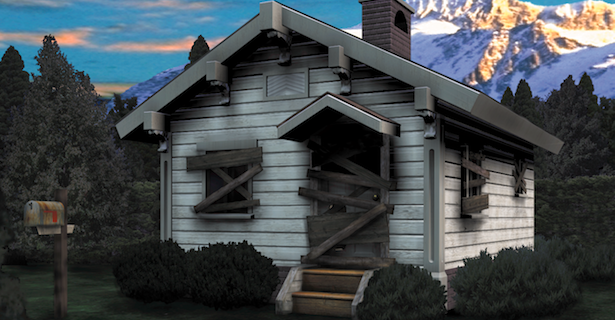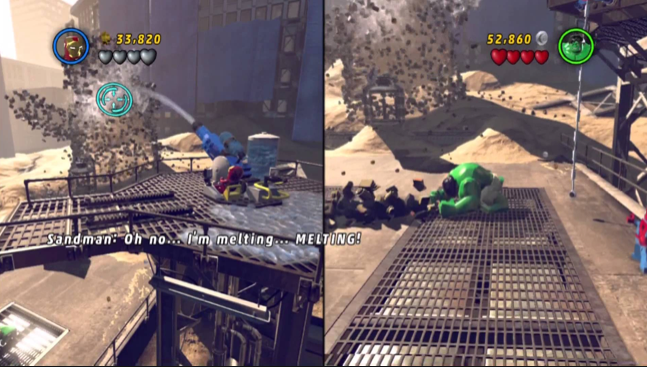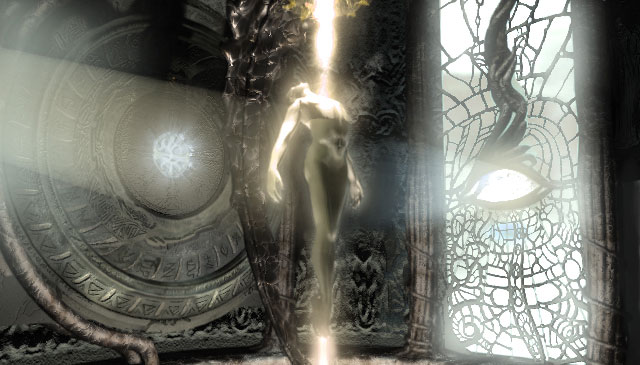Last year, as I was getting ready to move out to Indiana to begin my Ph.D. program, I watched the first season of the French television series The Returned. As I watched each episode (while I piled books into boxes and wrapped plates up in paper), I was struck by the show’s tone—the sort of quietly haunting atmosphere of its narrative, a narrative about the lives of the people living in a small town in France in which a series of strange phenomena occur, including the resurrection of the dead. But these are not your typical zombies because The Returned isn’t really a zombie narrative; rather, it utilizes this supernatural framing to explore loss, trauma, memory, and relationships. It’s a work of restrained horror, and many of its mysteries are left unsolved, mysteries that, ultimately, feel secondary to the stories of the characters that unfold throughout the show.
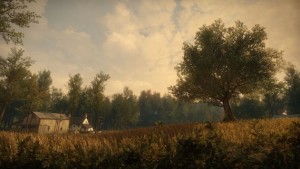 Everybody’s Gone to the Rapture (developed by The Chinese Room and released last week for PS4) seems to have a similar quality. It’s a post-apocalyptic game, sure, but it feels tonally different than most apocalypses. It’s a quiet, beautiful, lonely apocalypse, and this tone is established from the get-go through the game’s setting—a small and seemingly idyllic, pastoral village nestled in the English countryside, one in which the inhabitants have all mysteriously disappeared. Yet, it would seem that their memory remains, for as we walk through the town (into pubs where half-finished pints still sit on the tables and past cars with turn signals still blinking), we encounter fragmentary abstract flashbacks of a sort, which allow us to attempt to piece together an understanding of the stories of who lived here and what happened to them.
Everybody’s Gone to the Rapture (developed by The Chinese Room and released last week for PS4) seems to have a similar quality. It’s a post-apocalyptic game, sure, but it feels tonally different than most apocalypses. It’s a quiet, beautiful, lonely apocalypse, and this tone is established from the get-go through the game’s setting—a small and seemingly idyllic, pastoral village nestled in the English countryside, one in which the inhabitants have all mysteriously disappeared. Yet, it would seem that their memory remains, for as we walk through the town (into pubs where half-finished pints still sit on the tables and past cars with turn signals still blinking), we encounter fragmentary abstract flashbacks of a sort, which allow us to attempt to piece together an understanding of the stories of who lived here and what happened to them.
 While The Returned is more gloomy and brooding in its quiet presentation of supernatural phenomena, Everybody’s Gone to the Rapture is more tranquil and peaceful in its construction of tragedy. Here, “the end” (and end that seems to have been and gone) is not so much a frantic fight against undead hordes or the violent result of a nuclear holocaust but more of a quiet, resigned slipping away. As such, Everybody’s Gone to the Rapture isn’t scary. Nor is it action-packed. Which results in some pretty basic gameplay—there are no foes to be fought or puzzles to be solved. There is simply walking, looking, listening. And occasionally pressing X to open a gate or turn on a radio.
While The Returned is more gloomy and brooding in its quiet presentation of supernatural phenomena, Everybody’s Gone to the Rapture is more tranquil and peaceful in its construction of tragedy. Here, “the end” (and end that seems to have been and gone) is not so much a frantic fight against undead hordes or the violent result of a nuclear holocaust but more of a quiet, resigned slipping away. As such, Everybody’s Gone to the Rapture isn’t scary. Nor is it action-packed. Which results in some pretty basic gameplay—there are no foes to be fought or puzzles to be solved. There is simply walking, looking, listening. And occasionally pressing X to open a gate or turn on a radio.
 While this simplicity doesn’t necessarily feel boring to me (although it may not be everyone’s cup of tea), I do find myself, at times, hoping for even more opportunity to explore the world of the game. For a game that seems to be all about the exploration of its world, the extent to which we can actually interact with it is fairly limited, since the doors of many of the houses and storefronts can’t be opened and most of the objects (books, soccer balls, bicycles, suitcases) can’t be picked up or manipulated. But perhaps that’s because the gameplay is meant to mirror the narrative—it’s peaceful, it’s quiet, and it’s meant to orient us in the direction of the story of the town and its inhabitants.
While this simplicity doesn’t necessarily feel boring to me (although it may not be everyone’s cup of tea), I do find myself, at times, hoping for even more opportunity to explore the world of the game. For a game that seems to be all about the exploration of its world, the extent to which we can actually interact with it is fairly limited, since the doors of many of the houses and storefronts can’t be opened and most of the objects (books, soccer balls, bicycles, suitcases) can’t be picked up or manipulated. But perhaps that’s because the gameplay is meant to mirror the narrative—it’s peaceful, it’s quiet, and it’s meant to orient us in the direction of the story of the town and its inhabitants.
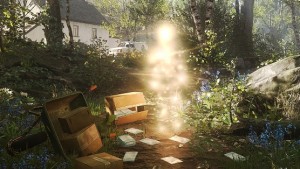 But I don’t know what that story is, exactly. I have a feeling that, even after finishing the game, I still won’t. Not entirely, anyway. Because, it seems to me, solving the supernatural mystery and wrapping up the narrative with a tidy bow is beside the point. The game, instead, seems to be about the messy lives of those who lived in this small community—the extramarital affairs, the estranged siblings, the loss of a spouse due to old age, the morally conflicted pastor. It’s these fragmented and intersecting storylines that keep me engaged, and, as a result, I’ve found that my involvement with the game has shifted as I play, shifted from initially wanting to find out how and why everyone disappeared to wanting to find out who they were before they left.
But I don’t know what that story is, exactly. I have a feeling that, even after finishing the game, I still won’t. Not entirely, anyway. Because, it seems to me, solving the supernatural mystery and wrapping up the narrative with a tidy bow is beside the point. The game, instead, seems to be about the messy lives of those who lived in this small community—the extramarital affairs, the estranged siblings, the loss of a spouse due to old age, the morally conflicted pastor. It’s these fragmented and intersecting storylines that keep me engaged, and, as a result, I’ve found that my involvement with the game has shifted as I play, shifted from initially wanting to find out how and why everyone disappeared to wanting to find out who they were before they left.
And it’s the game’s exploration of loneliness, isolation, memory, and loss that continue to make me think about its world and its connection to my own. Maybe that’s narcissism. Or maybe it’s just one way a game can resonate. I’m hoping it resonates well, that I’m not left feeling disappointed in the story it’s telling or the way it’s telling it. I guess I won’t know until I finish playing the game, which, on that note, is what I’m going to go do now.

